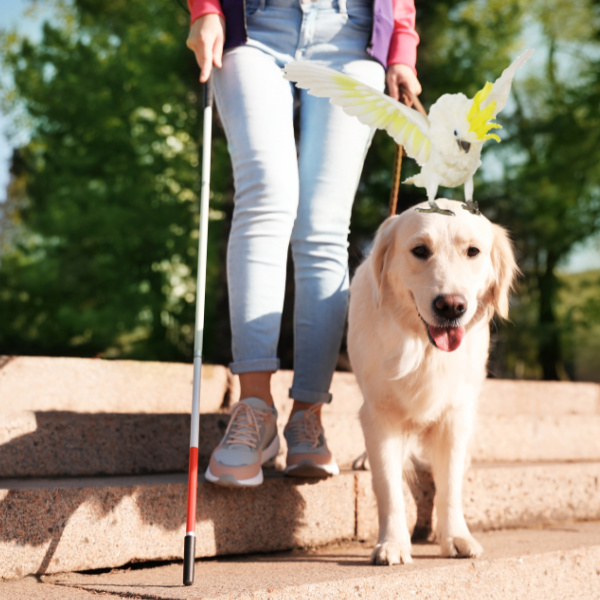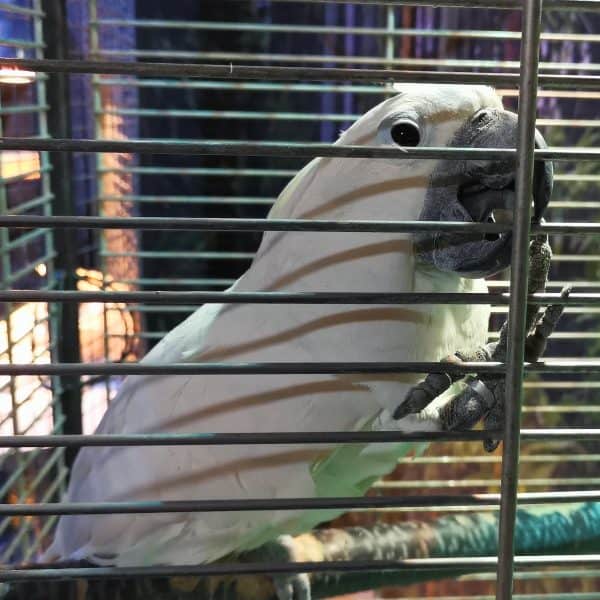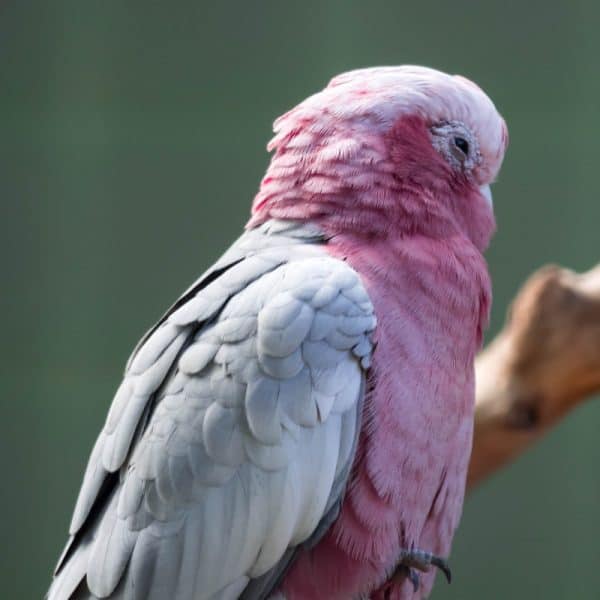Last Updated on by Mitch Rezman
This might be an interesting topic for a Birdie Brunch!
Hello, I’m Laurie Cannon, who wrote to you about the possibility of adopting an older Green-Winged Macaw.
We didn’t do that, however, we did contact a breeder about a Panama Amazon baby.
She seemed almost horrified when she found out both my husband and I are totally blind.
We already have the young Eleanora Cockatoo named Eleanor, who is a male despite his name.
I have owned parrots in the past for over 30 years.
The breeder seemed to think there are numerous things requiring vision in caring for a bird and there are no alternative ways to deal with the bird and its care without vision.
I agree toys require supervision but even a sighted person cannot keep their eyes on a bird the entire time it is awake.
Can’t ears provide enough feedback?
Even sighted people miss a blood feather accident sometimes right when it occurs and take action as soon as they discover the problem, don’t they?
I know they (pet birds) try to hide health issues and you can tell by the color of droppings but I have been able to notice even a slight abnormality in a parrot’s behavior in the past and gotten the bird to a vet in time.
So here’s the question:
Should parrots be an off limits pet to people who are totally blind just because they can’t see?
Can’t blind people tell what the bird needs in other ways?
Thanks!
Laurie
You are right Laurie, this is an interesting topic, so we’ll take a deep dive starting now.
The philosophy I’ve always been consistent with is that animals do not acknowledge their handicaps, humans must admit that they are handicapped if they’re to find quality of life solutions like:
- Text-to-speech for blind people.
- Wheelchairs for those unable to walk.
- Sign language for the deaf.
You get the idea.
Handicapped Bird Videos – What our birds teach us about disabilities
Starting with your original statement about acquiring an older Green wing macaw and then changing direction 180° by talking to a breeder about a young Amazon, is confusing.
If you’ve been a companion to pet birds for 30 years and you started when you were 10 you have to be at least 40 perhaps even 50 years of age.
An older bird-like a big macaw can live 50, 60 years, or longer.
Doing the math acquiring a 20-year-old bird means that the bird can live until it’s 80 meaning you would have to live to be 110 to take care of the bird the whole time.
Getting a younger bird means you will be even the older partaking as a caregiver to the former baby Amazon.
Thus your acquisition thought process is opaque to me.
I’ll say the breeder was partially right starting with “I agree toys require supervision but even a sighted person cannot keep their eyes on a bird the entire time it is awake.”
The issue is not keeping “eyes” on a bird for the entire time it’s awake.
What’s important is inspecting toys for things like splits in the wood which can catch a toenail or chewing ladder rungs by 10 budgies in a cage as in the video below.
In a matter of a single day, six of the rungs went from a simple cylindrical shape to what I would call pointy sharp “spears” which a bird could easily impale itself upon.
You could do braille-type inspections on everything in the cage but that’s not sanitary because you are going to be rubbing a lot of poop on your hands.
Bird toys that are placed in the center of the cage can become traps for birds who don’t know how to get back to the side of the cage.
Some species like budgerigars will give zero signs of illness until they drop to the cage floor dead. even to people with sight.
We had a cockatiel with ascites.
I knew she was sick when she was unable to fly from the floor of the bathroom to the shower curtain rod.
What I did (visually) notice was a 25 g of fluid built filled her abdomen which had to be drained weekly.
What if a bird becomes egg-bound, would you be able to determine that by sound and touch?
How are you keeping your bird safe from household hazards?
- Electrical wiring
- Open toilet seats
- Glasses half-filled with liquid
Sure you can possibly detect a blood feather but how would you fix it if a veterinarian is not available?
What if the bird encounters a more serious injury like falling from the perch in the middle of the night then breaking a wing?
How do you know when there’s poop in the water?
A panic flight can send the bird into a wall and said bird ends up with a concussion, now what?
What if you get severely bitten, are you able to perform first-aid, on your self or husband?
Please note that not one of those potential problems would never occur for a service dog.
I’m not trying to rain on your parade here Laurie.
I’m just advocating for the birds.
Clearly, the breeder has a totally bad attitude and I would steer clear.
I like the idea of an older macaw but males can exhibit high alpha behavior.
For example, if the macaw climbs to the top of the cage, assuming you have a dome top cage for longtail birds, the top reaching 6 feet or more, what is your plan for getting the bird off the top of the top then into the birdcage?
Also, a Greenwing macaw is double to triple the weight and four times the length of your Elenora (AKA medium sulfur-crested cockatoo), are you really ready to take on that challenge.
Cockatoos are indigenous to Australia.
Macaws come from South America as well as Amazon parrot.
Are you aware of the differences between birds coming from different continents because there are you know?
We have been having enormous success in reducing negative behavior in pet birds using light therapy.
The basic premise is to have a lamp fixture is close to the cage top as possible providing 12 hours of light and 12 hours of darkness.
This helps in synchronizing your bird’s circadian rhythm and reduces it stress level.
In general, how do you ensure you’re providing minimum light levels and cycles?
How do you know your bird is not sitting in darkness during the day?
Obviously, I’m more concerned about what can go wrong more so than what can go right.
The flip side to all this is sighted people have birds and still do all the wrong things which end up in failures translating into rehomed rescues with overflowing pet bird populations.
Perhaps a compromise could be a sighted assistant caregiver?
Someone who comes in two or three days a week just to do a visual inspection of all the things we just spoke about.
One thing I am certain about is that there are no certainties in life with birds.
There are no absolute dos and don’ts.
The best you can do is try.
Hope that helps and thanks again for the question.
Best
MitchR
Mitch,
Thank you for your response!
This is a very interesting topic.
I don’t know how many blind people keep birds, I wrote to you because I couldn’t find anything out on the internet.
So let me try and address some of your concerns and please ask more questions:
I only mentioned the change from the macaw to the Amazon because I had been the author of the macaw and young cockatoo message and I wanted to talk about the Amazon breeder’s resistance to selling to a blind person.
The reason for the switch was that, shortly after I wrote to you about the older male macaw, he was sold so the opportunity was gone.
I found the amazon breeder shortly thereafter and thought that a smaller bird than the large male macaw would be a better option for my husband.
He said he had a pet crow when he was a child but has never dealt with parrots until he met me.
He and Eleanor get along just fine, however, he keeps asking about macaws and birds that talk.
I keep explaining that large macaws require a very large cage and that talking ability is not a guarantee even if the species is known for it in general.
This is also true for amazons although the birds are smaller than the large macaws.
Anyway, I’m not sure if we will do anything else now.
As to your question about getting the large male macaw off the top of his cage which is taller than me, I can step on a step stool and reach the top of the cage to get him.
At one point several years ago, I had a female blue & gold macaw which is fairly large also.
I used to have to get her down occasionally and I used a step stool.
She knew to “step up” and would do so to my arm and I could guide her back into her cage.
I don’t have her any longer because I rehomed her to a breeder looking for a female B&G after my job was outsourced to India as a support engineer and programmer for HP.
I was unable to find steady work for some time and I worried about being able to care for the bird as she should be cared for.
So I let her go to the breeder and that was ultimately the right decision as my first husband was diagnosed with terminal brain cancer shortly thereafter.
Your question about hazards:
We keep toilet lids closed unless being used.
We do not keep half-full glasses around, this is also hazardous for blind people and home maintenance.
We sometimes have to remind our sighted friends or family to pick up their glasses and don’t leave them around.
Electrical cords, we run them through PVC pipes to keep birdie beaks away from them.
About the light cycles, I am not absolutely totally blind, I do have light perception so I can tell when lights are on or off, even weak lights like candles.
Even if I could not there is a device called a light probe which indicates to a person who cannot see the light whether the light is on or off.
Blood feathers: I had a small one break on the edge of Eleanor’s wing just recently. I applied the styptic powder and stopped the bleeding which was not very much.
Eleanor seems to be doing fine now.
I took him to the vet after it happened and she double-checked and said he was ok.
As to a fall and broken wing, I would wrap Eleanor in a towel, place him carefully in a soft carrier, and get him to the emergency facility.
I would use rideshare like Lyft to do this.
Editors note: Rideshares like Lyft and Uber are experiencing a surge in use for mediacal emergcies as they are much cheaper than an ambulance.
If I couldn’t find anything open, I would make a soft warm nest for him in a large crate I have.
I would cover it to keep him warm and keep him near to keep him as calm as possible until I could get him to the vet. I don’t know how to splint a wing so I would make every attempt to keep him as still as possible and warm to try and prevent shock.
Yes, sometimes I do get poop on my hands while cleaning the cage and checking anything toy-related on the bottom.
I wash my hands thoroughly with soap and water when finished. I replace damaged toys or file sharp places on parts of them so Eleanor isn’t hurt.
I also make sure any toys are placed near a perch so he can get back to safety.
You can tell there is poop in the water because it smells and the water feels somewhat viscous. I change his water 3, 4, or 5 times a day to keep this to a minimum.
I have been seriously bitten by birds before.
It’s just part of keeping birds when you are blind, you can’t see their body language and you get bitten sometimes because of that.
I keep a First Aid kit very handy in case this happens.
As I said to the amazon breeder, however, we say these feathered beings are highly emotional and that they are highly intelligent.
Are they not intelligent enough, if bonded to a person or people, to change the way they communicate their anger, distress, irritability, etc?
Sometimes they only do the visual indicator but often they will precede it or accompany it with a slight audible warning as well.
Or they will make every effort to avoid physical contact to show they don’t want any contact.
I don’t have access to a sighted person to come in 2 or 3 days a week.
We have friends who come for a visit sometimes and our son will come over sometimes.
They tell us if they notice anything about the bird and they also comment if things look especially good as well.
As you said we can only try.
I try to feed Eleanor properly, give him proper lighting, keep him socialized and make sure he is as healthy as I can with all senses available.
I read about birds a lot and have found your blog very helpful!
Yes, I know macaws, amazons, and cockatoos come from different parts of the world.
Thank you again!
Laurie
Mitch,
Interesting about the pet crow.
Those birds are nothing short of brilliant
Crows from the Corvid family and are considered hard bills versus parrots which are hookbills
I’m going to put the whole blind thing on hold for now.
For the two of you, it’s more of an inconvenience that you live with and nothing you consider to be a handicap.
I had an eye exam today knowing that my vision was degrading after my last eye exam and contact lens journey.
My left eye has degraded to 20/60 and I will be meeting with an eye surgeon very soon to talk about cataract surgery so I can go back and see if contacts will work better after cataract removal.
I’m going to focus on species now and advocate that you not that in Amazon.
From what I’ve observed over the years Amazon can get quite hormonal and you already have a unique three-way going with Eleanor.
Amazons can get weird even after they’ve been in a household for many years.
They have been known to attack out of jealousy and at the risk of telling a bad joke, “you will never have seen it coming.”
I would steer you back to macaws while reminding you that large macaws don’t necessarily need a huge cage if they are out a lot.
And that not all macaws are large.
Take a look at the mini macaws.
Noble macaws are the size of sun conures.
We have a campground neighbor who is legally blind.
He is a building engineer for a high-rise in downtown Chicago.
I asked him when we first met how he was able to perform his job?
He said he had been there, in the same building for 30 years, the entire building is braille to him he can do everything in the dark.
Let us know what other species you’ll be considering.
Best
MitchR
We asked “Should blind people keep pet birds? on Quora.
Laurie’s comment after reading the comments on Quora
“Mitch,
I have to say, way to go Chris Meredith!
I am amazed and saddened that it appears people have taken many steps back into the “dark ages” with regard to blind people and their willingness to try and understand how a blind person can do things.
I, like Chris, have been blind since birth except that I do have light perception.
Laurie”
Gotta comment? We’re here to listen.
Answered by Mitch Rezman
Approved by catherine Tobsing
Your zygodactyl footnote
Responses
| I really enjoy your blogs and I have been reading them for a long time.
On the subject of the blind taking care of birds- I just wanted to say that my mom passed away two months ago. She was legally blind and she would spend much time with my Cockatoo. She really loved this Bird and the Cockatoo loved my Mom. Casper would sometimes try to play rough with her and chase her down the hall and bite her foot. My mom never once got mad at her. I miss my mom and I treasure the relationship she had with Casper, especially now that my Mom is gone. Of course, my mom was not 100% blind, but she was legally blind. And there were other people in the house who did have full vision. Determining if a bird is bleeding would be very hard with no sight or if the bird is panting. These were our most recent visits to the Animal Hospital that were life-threatening without immediate attention. I would not tell a blind person they cannot have birds, but they do need to have a way to be able to take care of the bird properly. That involves having a sighted person who sees the birds daily. Once every 2-3 days would not be enough to save the bird from a life-threatening issue if it arises. Having disabilities myself, I believe all people should be treated with dignity and respect. Even though I don’t support taking care of a bird unassisted if you are completely blind, it is important to undertand that their wants in life are not different than anyone else’s. Finding some daily assistance from a sighted person is a good way around the problem. Mandy |
Author Profile
Latest entries
 Feeding Exotic BirdsDecember 29, 2025How to Switch or Convert Your Bird From Seeds to Pellets: Real-Life Case Studies and Practical Guidance
Feeding Exotic BirdsDecember 29, 2025How to Switch or Convert Your Bird From Seeds to Pellets: Real-Life Case Studies and Practical Guidance Feeding Exotic BirdsDecember 16, 2025A Practical, Budget-Smart Guide to Feeding Birds Well
Feeding Exotic BirdsDecember 16, 2025A Practical, Budget-Smart Guide to Feeding Birds Well Bird EnviornmentsDecember 7, 2025Understanding Budgie Cage Bar Orientation: Myths, Realities & Practical Solutions for Vertical-Bar Bird Cages
Bird EnviornmentsDecember 7, 2025Understanding Budgie Cage Bar Orientation: Myths, Realities & Practical Solutions for Vertical-Bar Bird Cages Feeding Exotic BirdsDecember 5, 2025How Dr. T.J. Lafeber Rewrote the Future of Pet Bird Nutrition
Feeding Exotic BirdsDecember 5, 2025How Dr. T.J. Lafeber Rewrote the Future of Pet Bird Nutrition



